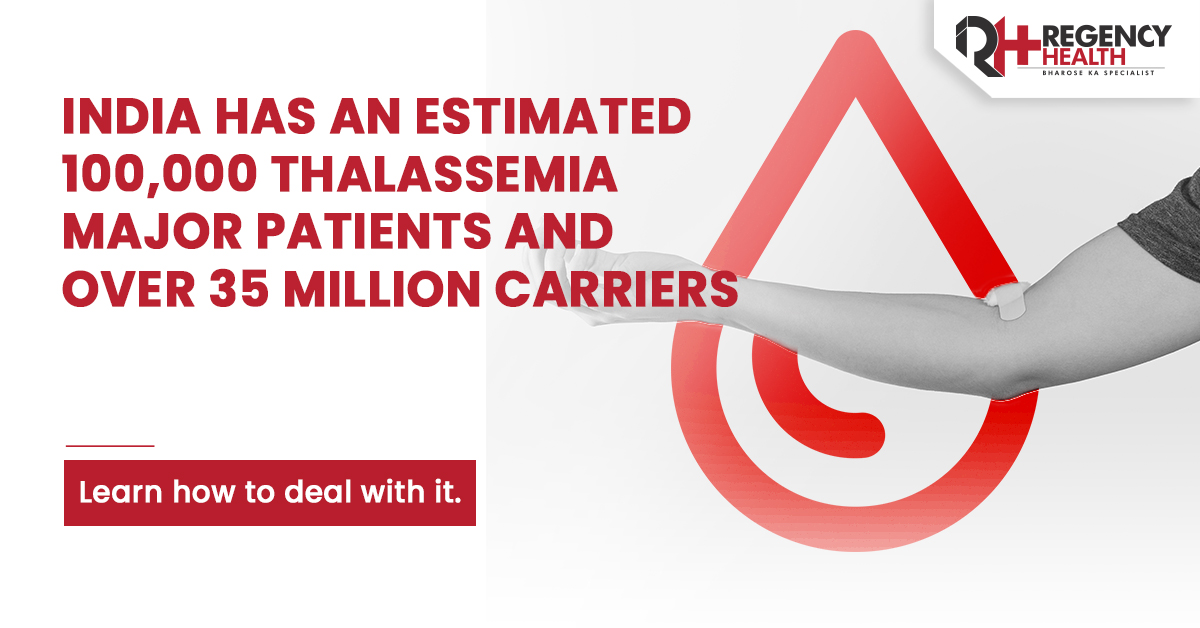
What is Thalassemia?
Thalassemia is an inherited blood disorder that affects the body’s ability to make healthy hemoglobin. Hemoglobin is a protein in red blood cells that carries oxygen to different parts of the body. When hemoglobin production is abnormal, the body doesn’t get enough oxygen, leading to anemia and related health concerns.
How Does Thalassemia Affect the Body?
In thalassemia, the bone marrow produces fewer healthy red blood cells and hemoglobin than normal. This shortage leads to anemia, which can cause fatigue, weakness, and other complications. Depending on the severity, some people may experience only mild symptoms, while others may need lifelong treatment.
Who Is at Risk?
Thalassemia is passed from parents to children through genes. It is more common in people with roots in regions where malaria was historically widespread, such as:
- South and East Asia
- Southern Europe
- The Middle East
- Africa
If both parents carry the thalassemia gene, there is a higher chance their child may inherit a more severe form of the disorder.
Causes of Thalassemia
Hemoglobin is made up of two types of protein chains: alpha and beta. Thalassemia occurs when the genes that control these chains are defective or missing.
- Alpha Thalassemia – Caused by mutations in the alpha globin genes. The severity depends on how many of the four genes are affected.
- Beta Thalassemia – Caused by mutations in the beta globin genes. The severity depends on whether one or both are defective.
Types of Thalassemia
Thalassemia is usually classified based on severity:
- Trait/Minor: Very mild or no symptoms. Often doesn’t require treatment.
- Intermedia: Moderate symptoms, may need occasional treatment.
- Major (Cooley’s Anemia): Severe symptoms that usually appear in early childhood and require regular treatment.
Common Symptoms
Symptoms may vary from person to person depending on the type and severity of thalassemia.
Mild cases:
- Fatigue or weakness
- Mild anemia
- Pale skin
Moderate to severe cases:
- Slow growth or delayed puberty
- Bone changes (especially in the face and skull)
- Enlarged spleen
- Jaundice (yellowish skin)
- Dark-colored urine
How Is Thalassemia Diagnosed?
Doctors use a series of blood tests to diagnose thalassemia:
- Complete Blood Count (CBC): Checks hemoglobin levels and red blood cell size.
- Hemoglobin Electrophoresis: Detects abnormal hemoglobin.
- Genetic Testing: Confirms whether defective genes are present.
Treatment Options
Treatment depends on the severity of thalassemia. While mild cases may not need medical intervention, moderate and severe forms often require lifelong management.
- Blood Transfusions: To maintain healthy red blood cell levels.
- Iron Chelation Therapy: Removes excess iron that builds up from frequent transfusions.
- Folic Acid Supplements: Helps the body make new red blood cells.
- Bone Marrow/Stem Cell Transplant: The only potential cure, but suitable only for selecting patients with a compatible donor.
- Newer Medicines (like Luspatercept): Can help stimulate red blood cell production in some cases.
Possible Complications
If not managed well, thalassemia can cause:
- Iron overload affecting the heart, liver, and other organs
- Bone deformities
- Growth delays
- Frequent infections
Regular follow-ups and proper treatment can prevent most of these complications.
Can Thalassemia Be Prevented?
Thalassemia cannot be prevented since it is genetic, but genetic testing and counseling can help couples understand the risks before planning a family. This is especially important if thalassemia runs in the family.
Living With Thalassemia
With modern treatment, many people with thalassemia can live long and healthy lives. Following treatment schedules, regular monitoring, and maintaining a healthy lifestyle play a big role in managing the condition.
Final Word
Thalassemia may sound overwhelming, but early diagnosis and proper care make a big difference. If you or a loved one shows signs of persistent anemia, consult a hematologist at a Multi Super Speciality Hospital in Lucknow. At Regency Multi Super Speciality Hospital in Lucknow, timely medical support ensures that thalassemia can be effectively managed, helping patients lead healthy and fulfilling lives.
Also Read: Low Blood Pressure: Signs, Causes & Fixes

 Call-an-Ambulance
Call-an-Ambulance



